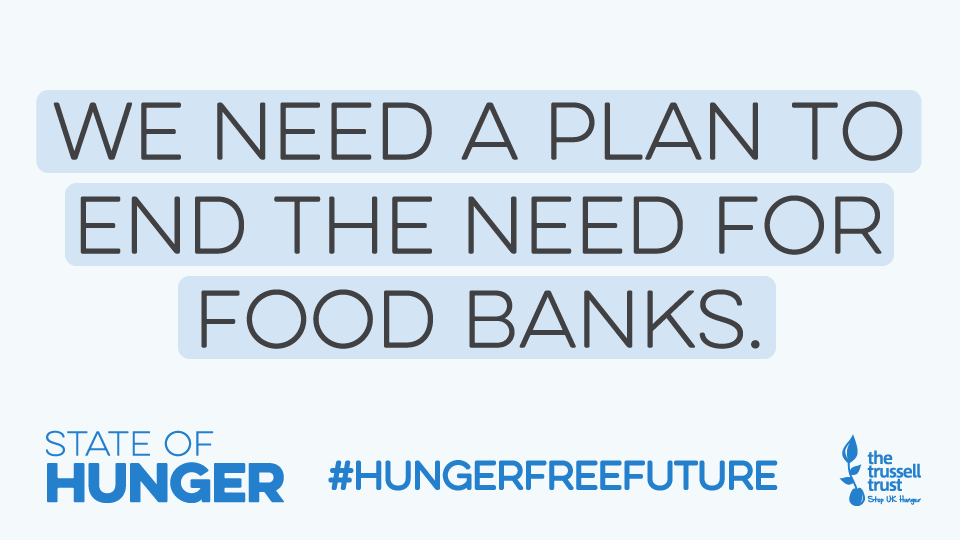By Tom Weeks, Research Manager at the Trussell Trust
Today, as part of the State of Hunger blog series, we are exploring how issues with housing can drive people to food banks.
With over 95,000 households living in temporary accommodation at the end of March 2021, today’s English homelessness statistics highlight the scale of the housing emergency we are facing. Despite the eviction ban (in place until the end of May 2021), in the first three months of 2021 alone over 36,500 households presented to their local council and were found to be homeless.
People referred to food banks are at the forefront of this emergency and are far more likely to be homeless than the national average. In early 2020, one in five (20%) people referred to food banks were homeless, that is living in temporary or emergency accommodation, staying at family/friends, or sleeping rough. In the 12 months before receiving support from a food bank, three in ten people (29%) had experienced homelessness and one in eight (12%) had experienced eviction.
Renting is also far more common amongst people referred to food banks than average. In early 2020, three-quarters (74%) of people who needed to use a food bank were renters, with a majority of them social renters. In 2019 just over one in three (37%) working age adults lived in rented accommodation.
Issues with the benefits that renters receive for their housing costs, and deductions to these benefits because of their housing circumstances can drive them into destitution and put them at risk of needing support from a food bank.
Homelessness can drive levels of need for food banks
Homelessness is often caused by a fundamental lack of income. In early 2021 the main reason that one in five (20%) private renters were found to be homeless was because of rent arrears. Renters often face a toxic combination of extremely high housing costs and insecure tenancies. Food banks across the country have seen the consequences of this lack of income with year on year increases in need and a consistently large number of homeless people referred for support.
We know that challenging life experiences such as homelessness can put people at greater risk of destitution and needing support from food banks. Homelessness can remove the support networks that people rely on or increase their living costs (for example if someone now needs to take public transport to work). Some people may also lose their job as they are unable to travel to it from their new accommodation. In the last decade, the number of households in England housed in different local authorities has increased by 315%, versus a 98% overall for the number of households in temporary accommodation. In the last decade, the number of households in England housed out of the area that they were living in has increased by 315%, versus a 98% overall for the number of households in temporary accommodation.
Homelessness can also increase the risk of adverse health. Living in unsuitable, poor quality or overcrowded accommodation can damage peoples physical and mental health and moving area can disrupt access to established medical support. The majority (66%) of homeless people referred to food banks in early 2020 were disabled.
Renters are being put at risk of needing support from food banks because of issues with their benefits
For renters referred to food banks, housing costs can push them into destitution. In early 2020, over one in four (28%) households referred to food banks had housing costs at similar levels to their total household income in the last month, suggesting that they had little (if any) money left to buy other essentials.
This is often due to issues of the adequacy of benefits. In early 2020, over one in four (28%) private rented households referred to food banks had a shortfall between their housing benefit and their housing costs. This meant they had to use the benefits meant for household essentials such as food to cover their rent. The very low levels of these core benefits means any use of them to cover rent puts people at risk of destitution.
Many social renters face deductions from their benefits because of the removal of the spare room subsidy (commonly known as the ‘bedroom tax’). We know that this is a significant issue for people referred to food banks, reducing the amount of income overall that they have to afford essentials. State of Hunger analysis shows that in a typical local authority, 100 more households subject to the ‘bedroom tax’ increases the number of food parcels distributed by 46.
In April 2020 the UK government made a welcome change in response to the pandemic, increasing the Local Housing Allowance rate (housing support for private renters). This is now frozen, exposing private renters to shortfalls as the real value of these benefits is eroded because of rent increases in the coming months and years.
The UK Government needs to develop a plan to end the need for food banks – this should recognise the role that housing, and the benefit system plays in driving levels of need.
To end the need for food banks we must ensure our UK social security system provides everyone with enough to afford the essentials.
This should ensure that the benefits that people receive to cover their housing costs are enough, so no one is forced to choose between feeding themselves and their family and paying their rent.
Making the £20 weekly increase to Universal Credit permanent and extending it to legacy benefits such as Employment and Support Allowance, would also give people the breathing space needed within their own budgets.
The UK Government should develop a plan in partnership with people with lived experience of poverty, including people who have experienced homelessness. This would help identify the changes needed to the social security and housing system, to ensure everyone has a safe and secure place to call home and a sufficient level of income to afford the essentials.



